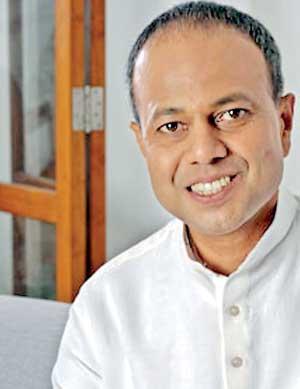Reply To:
Name - Reply Comment
 Sagala Ratnayaka - a senior Cabinet minister and the International Secretary of the United National Party (UNP) - marks 20 years in politics as an elected representative.
Sagala Ratnayaka - a senior Cabinet minister and the International Secretary of the United National Party (UNP) - marks 20 years in politics as an elected representative.
Hailing from the deep South, Deniyaya, Sagala had his education at Royal College Colombo. He graduated from the Lewis & Clark College USA with a degree in Economics and pursued a career in banking.
As the Head Prefect of Royal College in 1987, Sagala demonstrated his natural ability for leadership and one of his main responsibilities was to ensure that the activities of his school were not affected by the JVP insurrection engulfing the country at the time.
 It was quite evident that his stint as the Head Prefect of Royal College during a highly challenging period laid a strong foundation for his illustrious career in politics. Sagala earned a reputation among his school friends as a level-headed “leader” with an uncanny ability to work with diverse groups.
It was quite evident that his stint as the Head Prefect of Royal College during a highly challenging period laid a strong foundation for his illustrious career in politics. Sagala earned a reputation among his school friends as a level-headed “leader” with an uncanny ability to work with diverse groups.
One of his strategic objectives is to see the Southern Province empowered, harnessing its capacity to develop into an economic powerhouse; given the tourism potential of the region
Upon a brief career in banking, Sagala took to active politics and successfully ran for the Southern Provincial Council election in 1999. A year later, he was elected to Parliament from the Matara district, marking a milestone in his political career.
Sagala took up the challenge of serving as the Deputy Minister of Power and Energy in the UNP government in 2001 when the country was undergoing a severe power crisis. The young Deputy Minister worked expeditiously with the then Power and Energy Minister Karu Jayasuriya to find an effective solution to the debilitating crisis and stabilize the power and energy sector.
As an opposition MP from 2004 to 2010, Sagala fulfilled his responsibilities to the best of his ability and stood by the party leadership against many internal revolts. While many senior leaders within the party switched allegiance, Sagala never deviated from his core values and protected the party against many odds.
He mobilized the people in his electorate to fight the despotic regime through peaceful means, without resorting to violence and hooliganism. Although Deniyaya, his electorate, was traditionally considered a leftist seat, he managed to consolidate the UNP’s strength in the area and empower grassroots level supporters. As a result, he emerged stronger at the two national elections in 2015 and played a pivotal role in the party’s historic victory at the last Parliamentary polls.
The UNP has been amply benefitted by his strong connections in the global political domain. Under his guidance as the International Affairs Secretary, the United National Party has transformed itself into a political party with formidable international standing. The respect he commands in the diplomatic circles has stood him in good stead when discharging duties as the Chief of Staff to the Prime Minister.
With his current ministerial portfolio, Sagala oversees a vibrant segment of Sri Lanka’s economy – ports, maritime and logistics sector, and is entrusted with the task of transforming the island-nation into a regional maritime hub.
One of his strategic objectives is to see the Southern Province empowered, harnessing its capacity to develop into an economic powerhouse; given the tourism potential of the region, Sagala believes that this can be achieved as plans get underway for the kind of development Sri Lanka has not witnessed in recent history.
His indomitable fighting spirit was clearly demonstrated during the 51-day political struggle that ultimately ousted the purported government through a long-drawn battle in Parliament and in the judiciary
In line with the government’s for a Sri Lanka that is economically empowered, intellectually stimulated, its citizens on par with anywhere in the world in terms of achieving global success, enhanced living standards and tremendous opportunities available for all, Sagala believes in adopting a holistic and inclusive approach on development.
His indomitable fighting spirit was clearly demonstrated during the 51-day political struggle that ultimately ousted the purported government through a long-drawn battle in Parliament and in the judiciary. Sagala was a central cog in the machinery that held Temple Trees — the official residence of the legitimate Prime Minister — together as a symbol of beleaguered democracy in Sri Lanka.
As a representative of the public, Sagala understands the importance of staying connected with real-time issues. He believes in striking a balance between the needs of his constituents and the pressing issues Sri Lanka faces as a nation. With his ability to grasp the big picture, Sagala is also in sync with the broader vision of the government to usher in ‘change’ for young men and women who hold the key to long-term socio-economic progress and prosperity.